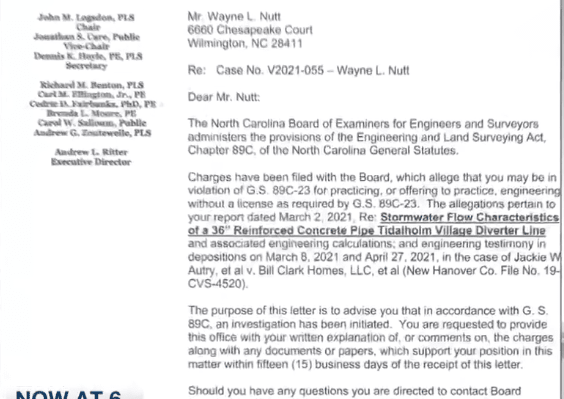§ 89C-23. Unlawful to practice engineering or land surveying without licensure; unlawful use of title or terms; penalties; Attorney General to be legal adviser.
Any person who shall practice, or offer to practice, engineering or land surveying in this State without first being licensed in accordance with the provisions of this Chapter, or any person, firm, partnership, organization, association, corporation, or other entity using or employing the words "engineer" or "engineering" or "professional engineer" or "professional engineering" or "land surveyor" or "land surveying," or any modification or derivative of those words in its name or form of business or activity except as licensed under this Chapter or in pursuit of activities exempted by this Chapter, or any person presenting or attempting to use the certificate of licensure or the seal of another, or any person who shall give any false or forged evidence of any kind to the Board or to any member of the Board in obtaining or attempting to obtain a certificate of licensure, or any person who shall falsely impersonate any other licensee of like or different name, or any person who shall attempt to use an expired or revoked or nonexistent certificate of licensure, or who shall practice or offer to practice when not qualified, or any person who falsely claims that the person is registered under this Chapter, or any person who shall violate any of the provisions of this Chapter, in addition to injunctive procedures set out hereinbefore, shall be guilty of a Class 2 misdemeanor. In no event shall there be representation of or holding out to the public of any engineering expertise by unlicensed persons. It shall be the duty of all duly constituted officers of the State and all political subdivisions of the State to enforce the provisions of this Chapter and to prosecute any persons violating them.
The Attorney General of the State or an assistant shall act as legal adviser to the Board and render any legal assistance necessary to carry out the provisions of this Chapter. The Board may employ counsel and necessary assistance to aid in the enforcement of this Chapter, and the compensation and expenses for the assistance shall be paid from funds of the Board. (1921, c. 1, s. 12; C.S., s. 6055

; 1951, c. 1084, s. 1; 1975, c. 681, s. 1; 1993, c. 539, s. 612; 1994, Ex. Sess., c. 24, s. 14(c); 1998-118, s. 21.)

